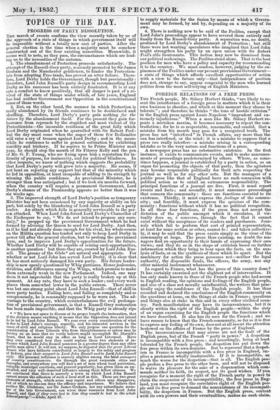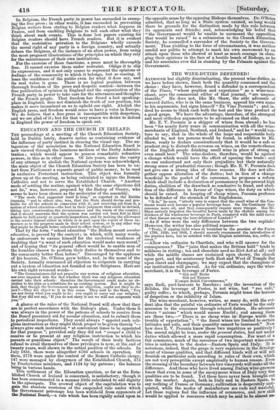FORRIGN RELATIONS OF A FHER PRESS.
THE French people, Mr. Sidney Herbert thinks, "are likely to re- sent the interference of a foreign press in matters which it is their own business to chastise, and which at this moment they choose to tolerate " ; and therefore he thinks "the tone of hostile criticism" in the English press against Louis Napoleon "imprudent and ex- tremely injudicious." When a man like Mr. Sidney Herbert re- peats a mistaken maxim, it becomes necessary to repeat the con- tradiction; for he is so respectable, reasonable, and candid, that a mistake from his mouth may pass for a recognized truth. The press has not " interfered " in French affairs any more than the sun has interfered, or the wind : it is a mistake to suppose that a press can really interfere—a mistake arising in a corresponding mistake as to the very nature and functions of a press. A newspaper press has no substantive existence. In the first instance, it exists to communicate events, and to make announce- ments of proceedings predetermined by others. Where, as some- times happens, a journal is established by a party in action, as an organ for promoting the objects of that party, then the agitators may become responsible politically for their acts respecting the journal as well as for any other acts. But the managers of a public press like that of England have no such connexion with political action as to entail an extraneous responsibility. The principal functions of a journal are five. First, it must report events and facts ; and secondly, it must announce proceedings that concern the community : those are functions essential to its existence. Thirdly, it must express the feelings of the commtc- nity ; and fourthly, it must express the opinions of the com- munity: functions without which it has no political recognition. In all these four functions, if the press does not accept the dictation of the public amongst which it circulates, it vir- tually does so, a converse, through the fact that it cannot exist without the acceptance of its readers and purchasers. Jour- nals which fail to perform that sort of printed representation, at least for some section or other, cannot be ; and taken collective- ly, it may be said that the press exists simply as the vicar of the community at large. The press thus existing, no doubt the ma- nagers find an opportunity to their hands of expressing their own views ; and they do so in the shape of criticism based on further information which they bring to bear upon the facts, on the ana- lysis of facts, or on the synthesis of those which lie apart. But the machinery for action the press possesses not—neither the legal authority, the disposable funds, the officers, the army, nor any other material instrument whatsoever.
In regard to France, what has the press of this country done P It has certainly exercised not the slightest sot of intervention. It has only made known to those of the French people who had access to English reading, the opinions and feelings of the English people, and also of a class not morally uninfluential, the writers that prac- tically enjoy the confidence of the English people. It has thus recorded and declared the conclusions of the English community on the questions at issue on the things at stake in France ; questions and things also at stake in this and in every other civilized coun- try. Such manifestation may have its inconveniences, but it is clearly within the right of the English people—within the duty of an organ exercising for the English people the functions which we have described. It also has its uses for the French ; and we have reason to know that the French community, so far as it is free to express any feeling of its own, does not at all resent the attention bestowed on the affairs of France by the press of England. The inconveniences that may accrue are not the fault of the English press, but of the French "party in power." A despotism is incompatible with a free press ; and accordingly, being at least tolerated by the French people, the despotism has put down the free press within its own domains. But to represent that a despot- ism m France is incompatible with a free press in England, im- plies a pretension wholly inadmissible. If it is incompatible, so much the worse for the despotism—that is all. The English peo- ple prefers a free press to the other boon, and will not be disposed to waive its pleasure for the sake of a dispensation which com- mands neither its faith, its respect, nor its good wishes. If you recognize for a moment the right of the French party in power to claim the suspension of its incompatibility, the free press in Eng- land, you must recognize the correlative right of the English peo- ple and its free press to demand the nonexistence of its incompati- bility, the despotism in France. But the English press, content with its own powers and their eventualities, makes no such claim.
In Belgium, the French party in power has succeeded in cramp- ing the free press ; in other words it has succeeded in preventing Belgian writers from stating to Belgian readers what happens in France, and from enabling Belgians to tell each other what they think about such events. This is done lest papers existing for Belgian readers should have French readers. But it is evident that the restrictive privation to the Belgians wholly exceeds the moral right of any party in a foreign country, and actually debars the Belgians, at the instance of an alien power, from using the most pregnant illustrations of the principles on which they rely for the maintenance of their own institutions. For the exercise of those functions, a press must be thoroughly free. It cannot exercise them under restraint. Oblige it to clip its expressions, and it not only ceases to represent the opinions or feelings of the community to which it belongs, but so ceasing, it loses the confidence of the public even for what it does say, and its real value is gone. There is no logical position between thorough freedom of the press and despotic control—between the free publication of opinion in England and the organization of the French party in power to take care for the utterances and thoughts of the French people. That freedom has found a last speaking- place in England, does not diminish the truth of our position, but makes it more incumbent on us to uphold our right. Abolish the English press, and freedom would cease to have a voice in Europe. We do believe that a free press is incompatible with despotism, and we are glad of it ; but for that very reason we desire to defend in England the power of freedom to speak out.



























 Previous page
Previous page